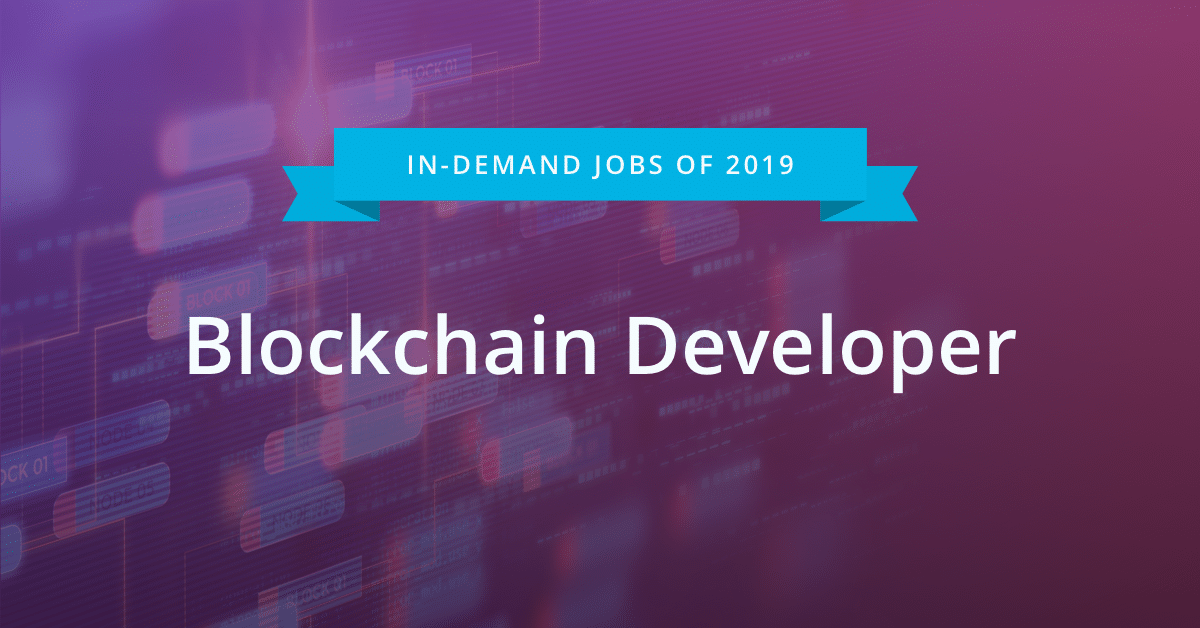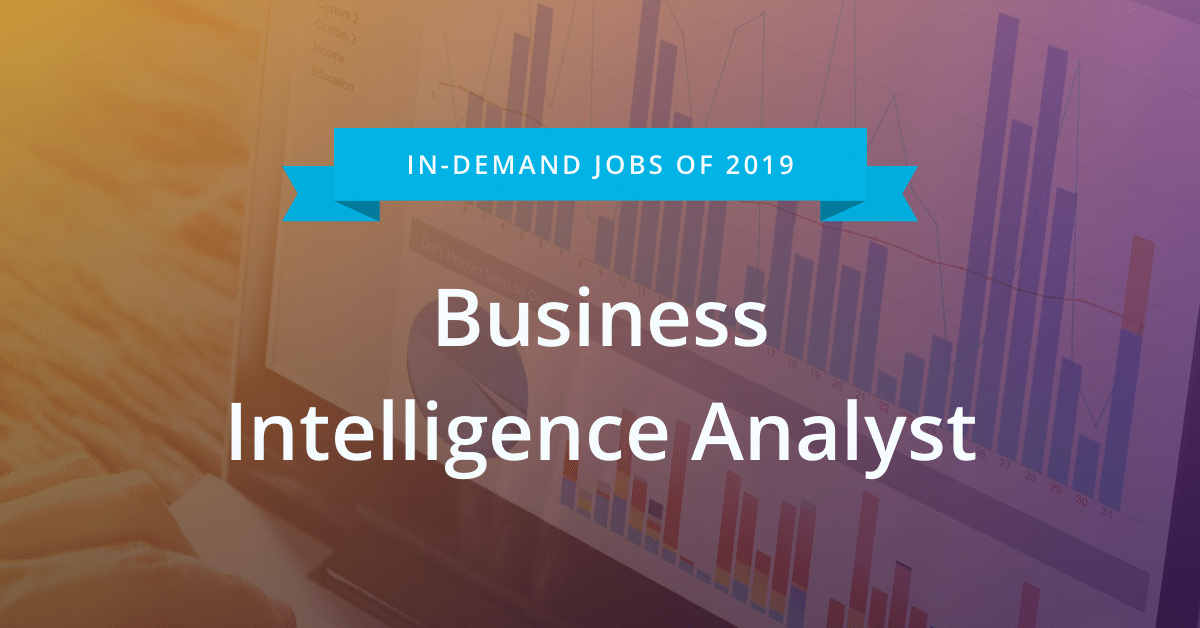Read our new post about the best jobs of 2020!
Make 2019 the year you set yourself a new career goal, learn new skills, and change your life. To give you some ideas on where you should focus your efforts, we’ve profiled some of the hottest tech jobs you should consider right now.
Blockchain Developer
LinkedIn’s recent 2018 US Emerging Jobs Report profiled the jobs and skills growing most rapidly across the US. All of the jobs on the list have been experiencing tremendous growth, but one role still managed to stand out—Blockchain Developer. Driven by the surging interest in blockchain and cryptocurrencies, the number of people who added “Blockchain Developer” to their LinkedIn profile experienced 33x growth between just 2014 and 2018!
So how do you become a Blockchain Developer? Well, in an interview with Aaron Brown, VP of Engineering at Madhive, that we published last year, Aaron gave us this great insight into what recruiters are looking for in new recruits in the blockchain space:
“We’re looking at whether you know what you’re talking about. If you’ve built your own blockchain, for example, that’s a great way for recruiters to quickly establish you have the programming skills to succeed.”
LinkedIn’s report echoes this sentiment, identifying that the top demonstrable skills you’ll need to succeed in this role include both solid programming skills, in-depth understanding of blockchain protocols such as Bitcoin and Ethereum, and experience with Node.js. Udacity’s own Blockchain Developer Nanodegree program is a great place to start building these skills. You can also learn more about how blockchain technology is impacting our world in our exclusive docuseries, Built on Blockchain.
Top skills you’ll need: Blockchain architecture, Ethereum, Bitcoin, smart contracts
Software Engineer
LinkedIn’s 2018 US Emerging Jobs report also ranks the tech job titles experiencing the greatest hiring growth, year-over-year. On that list, Software Engineer sits at the very top, with over 80,000 job openings listed on the site! This reflects a key trend we’ve seen in the past few years, with recruiters’ thirst for new software engineers far outpacing the number of qualified candidates. That kind of demand makes it a VERY good time to start learning to code!
Of course, being in demand is great, but you also want to enjoy your role. Fortunately, it’s a job people tend to love. This, for example, is what Udacity graduate, Robin Stringer, said about why he chose to learn more about software development:
“Software development seemed to offer EVERYTHING I hoped for in a career. It’s intellectually taxing work, and there’s a close relationship between effort and accomplishment.”
So how do you become a Software Engineer? “Software Engineer” is a pretty broad job title, and is often used to cover work with a vast array of different tasks and responsibilities. As an engineer working on apps, for example, you could be working on the next big hit on the iOS App Store or Play Store. As someone responsible for front end web development, you’ll be working on the user-facing aspects of different websites. Take a look at the School of Programming for more information on the different career paths available, and start learning the critical skills you’ll need to learn to land a dream career in your chosen area.
Top skills you’ll need: Java, SQL, JavaScript, C++, Python
Business Intelligence Analyst
Robert Half’s Technology Salary Guide 2019 lists 13 crucial roles that companies are struggling to fill as they start the New Year. Business Intelligence Analyst features prominently on this list and, like many of the other roles in this article, scarcity of suitable candidates means companies are willing to pay high salaries to land talented employees. Robert Half reports that entry-level candidates can expect salaries around $85,750, while experienced Business Intelligence Analysts can earn upwards of $178,000!
So how do you become a Business Intelligence Analyst? Business Intelligence Analysts are in demand because they help companies make sense of all their data—turning masses of data points into actionable business insights that can help a company do everything from sell its products, to optimize its supply chain, to connect its employees. Business Intelligence Analysts need both strong data analysis and modeling skills, as well as deep understanding of an industry and a particular company. They don’t necessarily need to be able to program, but they should be fluent in Alteryx and Tableau, two tools used by nearly every Business Intelligence Analyst.
Top skills you’ll need: SQL, Tableau, data modeling, Alteryx
Machine Learning Engineer
With a median base salary of $182,000, according to Linkedin data, Machine Learning Engineer is unsurprisingly ranked as one of the most promising tech jobs of the coming 12 months. Year-on-year growth in the number of Machine Learning Engineer job openings is 96%—so opportunities are definitely out there—and the role also sees high career advancement potential.
So how do you become a Machine Learning Engineer? To become a Machine Learning Engineer, you’ll need to be able to build models to handle data, and should understand supervised and unsupervised learning, As you get deeper into the subject, you’ll also need to have studied concepts such as deep learning and reinforcement learning, and you should be able to show that you’ve actually applied this theoretical knowledge to try to build things for yourself.
Top skills you’ll need: Python, Data Mining, Supervised Learning, Unsupervised Learning
Data Scientist
Regularly ranked as Glassdoor’s top job in the US, Data Scientists are in hot demand by almost every industry. Businesses want candidates who can help them realize the power of data, through tasks such as running data pipelines, building machine learning models, and deploying data applications. Candidates with these kinds of skills are currently in short supply, and this level of demand means qualified data scientists command high salaries—LinkedIn says the median base salary is $130,000—and they can take their pick from a slew of roles at exciting companies.
So how do you become a Data Scientist? To land a role as a data scientist you’ll need a passion for data, and you’ll need to focus on building advanced skills in areas like deep learning, unsupervised learning, and data engineering. You’ll also need to be able to show you can apply those skills through a portfolio of projects that demonstrate you can put theory into practice.
As one Udacity graduate told us last year:
“I think a large part of how I landed my data scientist job was that I’d build up a portfolio in the program… that was a real advantage for me during the interview. And I could use my practical skills during the technical evaluation assignment they set me!”
Top skills you’ll need: Data mining, data analysis, machine learning, deep learning
–
Make 2019 the year you land one of the world’s most in-demand tech jobs. Take your career to the next level by taking a look at our Nanodegree programs today.













